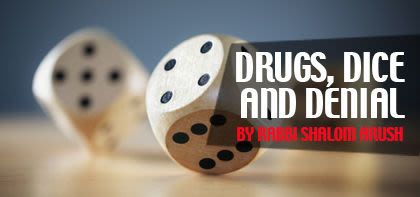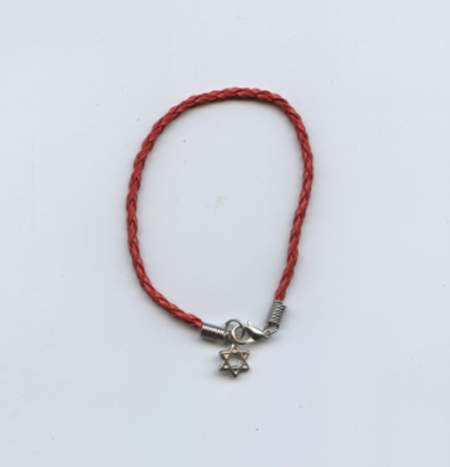
Drugs, Dice, and Denial
A person with an addictive behavior must be honest with himself about the people and situations that are detrimental for him...

People with addictive behavior, especially those entangled in drugs and gambling, have one thing in common – they’re all in denial. Why do I say “people with addictive behavior” and not “addicts”? It’s because they have holy souls in their midst, and at the core, they have Divinely-instilled capacity to desire the right things. So, as soon as a person admits that he has a problem, and he turns to Hashem for help, he’s already on the road to kicking his habit and becoming free again.
With the above in mind, let’s suppose that a person has a drug problem: the first thing he must do is to stop the denial and admit to Hashem that his futility in dealing with his addiction. He must beg Hashem for the will to overcome the drugs and for the clarity to see the devastating effects of his habit. He must plead with Hashem to send him the right messengers who know how to overcome such a problem, or who overcame addictions themselves. He must admit that he loves the substance usage, if that’s the case, and beg Hashem to help him stop loving the thing that is ruining his health and his life.
The justifications and rationalizations must stop. A so-called addict – whether hooked on drugs, gambling, debauchery or even food – must plead Hashem to show him how the addiction is the Satan himself. He must pray that Hashem distance him from temptation and the wrong influences, and be honest with himself about the people and situations that are detrimental for him. He must stay away from anything,  anyplace or anyone that reminds him of drugs, while asking for Divine assistance in avoiding pitfalls.
anyplace or anyone that reminds him of drugs, while asking for Divine assistance in avoiding pitfalls.
An individual with a gambling problem who admits his problem won’t go to a casino to drink a cup of coffee. And if he has decided to take a summer vacation, he won’t go to Atlantic City, Las Vegas or Monte Carlo, for he knows that he won’t resist the temptation of the dice, the roulette wheel or the poker table. Why? He has stopped fooling himself; he is no longer in denial. He knows that in a tight spot, he’d be willing to risk his entire home on the roll of the dice. He hears the inner voice saying, “Where are you? Stay away from racetrack!” He begs Hashem to help him have one more “clean” day with no gambling. If he does succeed in having a clean day, he thanks Hashem and begs that tomorrow will also be a gambling-free day.
Rebbe Natan of Breslev was a spiritual giant who deserves the credit for recording, explaining and printing Rebbe Nachman’s teachings for posterity. He never fooled himself, for he had the inner strength to say in one of his prayers (Prayer following the recitation of the Tikkun HaKlali), “By virtue of the holy tzaddikim who had impeccable personal holiness, I hope and pray that You will not let my soul descend to the netherworld. Please, Hashem, save me! Look how vulnerable I am, prone to danger.”
Even though Rebbe Natan was holy of holies, when speaking to Hashem, he still categorized himself as “danger prone”. He was still afraid of succumbing to temptation, so he yelled to Hashem nightly for help. He was terrified that if he didn’t beg Hashem for help, he’d become smug and arrogant, for as long as the soul is trapped in the body, a person is danger prone. Rebbe Natan’s behavior was the total opposite of denial – he admitted every tiny flawed thought to Hashem. That’s how he climbed to such a lofty spiritual level.
Reality shows that people cry out for help as soon as they sense physical danger but most are in a deep slumber when it comes to encountering spiritual danger. They don’t see how easily they fall into the evil inclination’s traps. Rabbi Moshe Chaim Luzzatto writes (The Path of the Righteous, Gate of Caution), “A person should be cautious in his deeds and in all of his affairs; in other words, he must assess his ways, if they are good or not, and not to abandon his soul to danger and to oblivion, Heaven forbid, and not to walk like a blind person in the darkness. The brain surely obligates such an approach. Once a person has the common sense to flee from spiritual oblivion, how can he ignore the means to save himself, for this would be utterly inane and detrimental. One who is not cautious is worse than an animal for the animals instinctively protect themselves, fleeing from any and all danger and threats. One who goes through the world without self-assessment, if his ways are good or not, he is like a blind man walking on the banks of the river and therefore in certain, imminent danger. There is no difference between physical blindness and willful closing of one’s eyes to danger.”
A with an addictive behavior issue should turn denial into determination and never lose hope, for Hashem will surely answer his cry for help.








Tell us what you think!
Thank you for your comment!
It will be published after approval by the Editor.